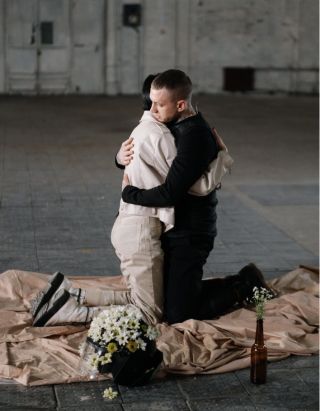Trauma
How Historical Trauma Lives in Us All
Intergenerational trauma lives on all sides of our divided world.
Updated January 13, 2024 Reviewed by Ray Parker
Key points
- Historical trauma lives in all of us, pushing us to react in ways that may not match the present situation.
- By understanding our historical trauma, we can work to heal and prevent it from harming ourselves and others.
- Instead of shaming ourselves or others, we can approach each other with compassion, acknowledging our pain.

Like so many holiday dinners, as we decorated our meals with cranberry sauce, we shared gratitude for finally getting together as a family. The grandparents asked the kids about their Christmas gifts as we poured gravy on our plates. And then, as always, politics snuck its way in between the stuffing and Brussels sprouts, spicing up the meal with an extra helping of heated emotions.
While I imagine tables across the continent arguing for or against opposing politics, maybe we're not so different in how easy it is to divide the world into good and bad based on the behaviors we observe in others.
"It's simple. They're morally deficient," my relative asserted as one of my sons circled the table, screaming the lyrics to Jingle Bells to distract us away from the tension.
"No, they're not," I quipped, immediately regretting taking the bait. "They're just in fight or flight mode. They feel unsafe and have a lot of historical trauma being triggered right now."
Because I'm not wired any differently than the "bad guys" my relative vilified. My nervous system is designed to just as easily be triggered into fight or flight when I feel threatened.
And so is yours.
We, as humans, are capable of astonishing empathy, compassion, creativity, and cooperation. But our nervous systems must be regulated so our stress response doesn't hijack them.
Yet regulation requires safety.
We're currently living in a spiral of escalating conflict: When most everyone is triggered, our reactive behaviors create an unsafe world. And without safety, everyone gets triggered.
Historical Trauma Lives in Us All
In my home of Canada, we're facing a long-overdue reckoning with our history of cultural genocide from government-mandated residential schools, where Indigenous children were stolen from their parents to—as Canada's first Prime Minister, Sir John A. Macdonald reasoned—"take the Indian out of the child." [1]
Derek Thompson-Thlaapkiituup, the director of Indigenous Engagement at the University of British Columbia, gave the opening speech at our annual Pacific Psychopharmacology Conference in Vancouver, BC, the day before this year's National Day for Truth and Reconciliation. He warned us not to diagnose mental health symptoms in Indigenous people as the dizzying array of Diagnostics and Statistical Manual of Mental Disorders (DSM) labels, but of the "affliction of the Residential School Syndrome," echoing the concept of "Concentration Camp Syndrome" that describes the enduring challenges carried in the bodies of Holocaust survivors and their descendants.
When we think of the impacts of intergenerational trauma, we often reference the descendants of survivors of genocides, slavery, or colonialization. But we fail to acknowledge the unresolved trauma of living in the bodies that perpetrate and benefit from the harm.
"If First Nations people are sick," Thompson-Thlaapkiituup asked, "If we pass along intergenerational trauma of the Indian residential school syndrome to our children and grandchildren, this begs the question, how sick are the people that created the Indian residential school system, and what are they doing about their sickness?"
Healthy, happy people don't intentionally harm others. But ones living in scarcity or feeling unsafe do so when their nervous systems are pushed into fight, flight, or freeze to survive.
When we or our ancestors have experienced recurrent or serious threats, our nervous systems adapt by fine-tuning our alarm systems to react more strongly by rapidly pushing us towards fight, flight, and freeze. We habitually jump into this survival response at even a hint of danger, forgoing our higher brain functions of empathy, compassion, and balanced thinking. This is how we are capable of dehumanizing, oppressing, and hurting others.
American trauma expert Resmaa Menakem explains how the root of the historical trauma living in the bodies of Black and Indigenous people is the historical trauma residing in the bodies of their White oppressors that made them so capable of committing or complicity in witnessing such crimes against humanity.
"The conflict has been festering for centuries," he writes in My Grandmother's Hands: Racialized Trauma and the Pathway to Mending Our Hearts and Bodies. [2] "They began in Europe during the Middle Ages, where they tore apart close to two million white bodies. The resulting tension came to America embedded in the bodies of Europeans, and it has remained in the bodies of many of their descendants."
Historical trauma lives in every one of us, Menakem argues, affecting our behaviors in the present.
Acknowledging Our Historical Trauma
Thomas Hübl focused his life on facilitating groups to heal from collective trauma in Israel after learning about the darkness inhabiting his family's bodies from his grandfather, who served in the Austrian army annexed by the Nazis during World War II.
"The ultimate question regarding the darkness we see outside us is not whether it will consume our world, but instead whether we can reframe our understanding of that darkness," he writes in Healing Collective Trauma: A Process for Integrating our Intergenerational and Cultural Wounds[3]. "How can we come to recognize the dark as part of ourselves so we may integrate its lessons and through them be transformed?"
But it's deeply painful to acknowledge that this darkness lives inside us. It's why so many of us choose to deny racism, sexism, classism, or any other system of social injustice rather than acknowledge how we participate in, perpetuate, and benefit from the system. Yet when we refuse to acknowledge the darkness we carry from our pasts, we risk acting it out repeatedly, which Hübl describes as our destiny, projected onto tomorrow.
Healing Historical Trauma
Not only is historical trauma passed on intergenerationally, but it accumulates in subsequent generations when one's ancestors didn't have the opportunity to heal from it.[4] That's why we need to heal the historical trauma carried in our bodies, bring awareness to it, and integrate it into our whole understanding of ourselves and our world. Every generation that works towards healing the trauma of living in their bodies helps to slow its transmission to the next one.
"To assist in its repair, we must choose to acknowledge, witness, and thereby feel together what has actually occurred," Hübl explains. "Because to look away—to dismiss, deny, minimize, or willfully forget—is to uphold the institutions of inequality, of inhumanity, that created them."
Yet, it's hard to acknowledge what we can't see. So much of the trauma is hidden in our cells, without any visible scars to tell the story of how it got there. We can start healing by validating that our inner experiences make sense, even if our heated reactions seem "irrational" at times. If our alarms scream, there's a reason. But sometimes, rather than the alarm matching the danger of the present situation, it recognizes patterns of danger learned from our ancestor's trauma from generations ago.
"If your (or anyone's reaction) to a current situation has more (or far less) energy than it normally would, then it likely involves energy from ancient historical trauma that has lost its context," Resmaa Menakem explains.
We can observe our body for signs of getting activated or shutting down into fight, flight, or freeze. Then, we may need to seek safety and soothe our nervous system before we have the capacity to evaluate our body's alarm with perspective to see if it's pushing us towards a helpful response in the present.
We can also explore the history of our alarms compassionately so we understand that they make sense because of our past, even when they are firing too often or intensely in the present. The same is true for understanding the behaviors of others, from offering empathy to the grumpy man in the grocery store line to trying to comprehend the cruelty in Gaza. Rather than the blame and shame that dehumanizes each other as deplorable, can we see that we all have personal or historical trauma steering our behaviors into dark places simply to survive?
Acknowledging trauma with compassion doesn't take away from the concurrent need for justice, accountability, and boundaries against behaviours that cause harm. We can only extend compassion when the harm is acknowledged and boundaries are in place to prevent it from happening again.
Poet yung pueblo writes:
reminder:
you can love people and
simultaneously not allow
them to harm you
We Are Our History
"History is not in the past. It is in the present," wrote American civil rights activist James Baldwin. "We carry our history with us. We are our history."
It's only through acknowledging these patterns of trauma living so loudly inside all of us that we can step outside of the spiral and choose the freedom of a healthier path.
References
[1] Sypnowich C. (2021). Monuments and monsters: Education, cultural heritage and sites of conscience. Journal of Philosophy of Education, 55: 469–483.
[2] Menakem, M. (2017). My Grandmother’s Hands. Central Recovery Press.
[3] Hubl, T (2020). Healing collective trauma: a process for integrating our intergenerational & cultural wounds. Boulder, Colorado: Sounds True.
[4] Duran, E. (2019). Trauma-informed counseling Indigenous Communities (2nd ed). Teachers College Press: Columbia.




